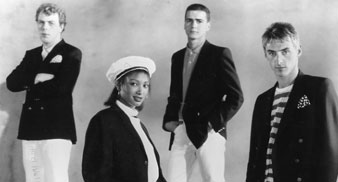
The Core Style Councilors - Mick Talbot, Dee C. Lee, Steve White And Paul Weller
Paul Weller quit The Jam at the height of its fame in 1982, and he changed direction as markedly as he could by forming The Style Council. He went from fronting a power trio to becoming a member of a jazz-pop quartet. The change was marked, but not that abrupt – the final Jam album (“The Gift”, 1982), some A-sides like “Beat Surrender” and several late-period B-sides (many of which are found on the “Extras” compilation) show us that the sound of The Style Council was a natural destination to arrive at for someone who loved jazz, soul and Motown as much as good old rock & roll.
He made a deliberate attempt to avoid being placed on the epicenter of it all by bringing a keyboard player in, and letting him have an equal creative role. The one he chose, though, made many fans roll their eyes in disbelief – Mick Talbot had been a member of The Merton Parkas, one of the worst Mod-revival bands of the late ‘70s. Talbot was treated as an equal by Weller all the way through, even when it was evident that Paul had not brought a McCartney (or even an Entwistle) along for the ride.

Paul Weller & Mick Talbot
The remaining councilors were to be singer Dee C. Lee (who was to eventually marry Weller) and drummer Steve White. He remains one of Paul’s most loyal collaborators to this day. Incidentally, he is the older brother of Alan, the drummer for Oasis during their glory days.
The singular adventures of The Style Council are easily split in two stages. The first ranks among Weller’s most prolific periods ever, and it encompasses the albums “Café Bleu” (1984) and “Our Favorite Shop” (1985), not to mention endless singles that were not included on those records such as “Speak Like A Child” and “Long Hot Summer” – two compositions in which Paul’s updated vision was really fruitful.
“Our Favorite Shop” (rechristened “Internationalists” in the US) marked the pinnacle of the new outfit. After that point, everything went downhill pretty quickly. Alarms went off with “The Cost Of Loving” (1987), and “Confessions Of A Pop Group” (1988) was to set the scene for Weller’s severing of bonds with Polydor. The decade ended with Paul without a contract, without a direction, and wholly unmotivated.
Leaving aside that the approach to The Style Council’s music that Paul championed was unviable because his creative partner was not as skilled as he was, the band also suffered from a strong image problem as Paul insisted on infusing videos and interviews with a touch of humor. And (for all his ear for melody), poor Paul was as unfunny as Roberto Benigni as Demetrius in the “Asterix” live-action movie. His jokes either fell flat or made people think something nefarious of him and the band.
The Style Council was also a radically politicized band, and Paul’s involvement in the Red Wedge Movement (a fusion of music and politic rallies meant to illustrate the youth of Britain) was to leave him embittered and incommunicative. Couple that with the disdain that he began to feel for the fans who couldn’t outgrow the Jam and the constant (and gratuitous) comparisons by critics, and the state of discomfort of Paul as the ‘80s ended couldn’t be made more explicit.
In hindsight, the Style Council was an outfit hindered by its leader’s own aspirations and the lack of enough collective creativity to carry them through. The band tried to have a true internationalist appeal but in the end only some European markets were conquered. Polydor wanted (and expected) an artist of Paul Weller’s stature to crack the American market the second time around. But Paul’s own reticence to tour there and the fact that his father felt ill at ease marketing a band like the Council (as opposed to the Jam, an outfit that entailed uncomplicated logistics) simply aggravated it all.
That does not demerit the early years of the band and the excellent body of work it produced over its first two albums, of course. With The Jam, Paul had known when to surrender the flag. This time, he was to cross the line. He eventually got it all together again in the ‘90s, being lauded as the Modfather and revered for his contribution to guitar-oriented rock by bands like Oasis and Blur. When all is said and done, The Style Council days will always be remembered as the time Paul tried to open up a little and succeeded partially, before shutting himself up like never before, piling indulgence after indulgence.
Most of all, the band reminds us how difficult it is for a successful artist to shake off the legacy of a previous unit and carve a new pathway, no matter how much enthusiasm one has to begin with. Would you say that Weller’s eventual re-embracement of guitar music was a rediscovery of his true self, or something more like a sentence imposed upon him by the industry and his fans alike? I’d love to know what you think – shout out in the “Comments” below, please.

I first became aquainted with Paul Weller through The Style Council in the 1980’s and therefore had very little experience with The Jam. I think that while your article is thoughtful and knowledgable on the subject of The Style Council, that it misses the point of the band. The point of the band was not to be the best musical group in history…they were not competing with The Beatles…rather, they were trying to show that anyone could be a part of society if they wanted to be, and it was a socialist idea. I got the idea that the group was Socialist at the time without reading anything about them, just listening to their music which was the point. Jonathan.